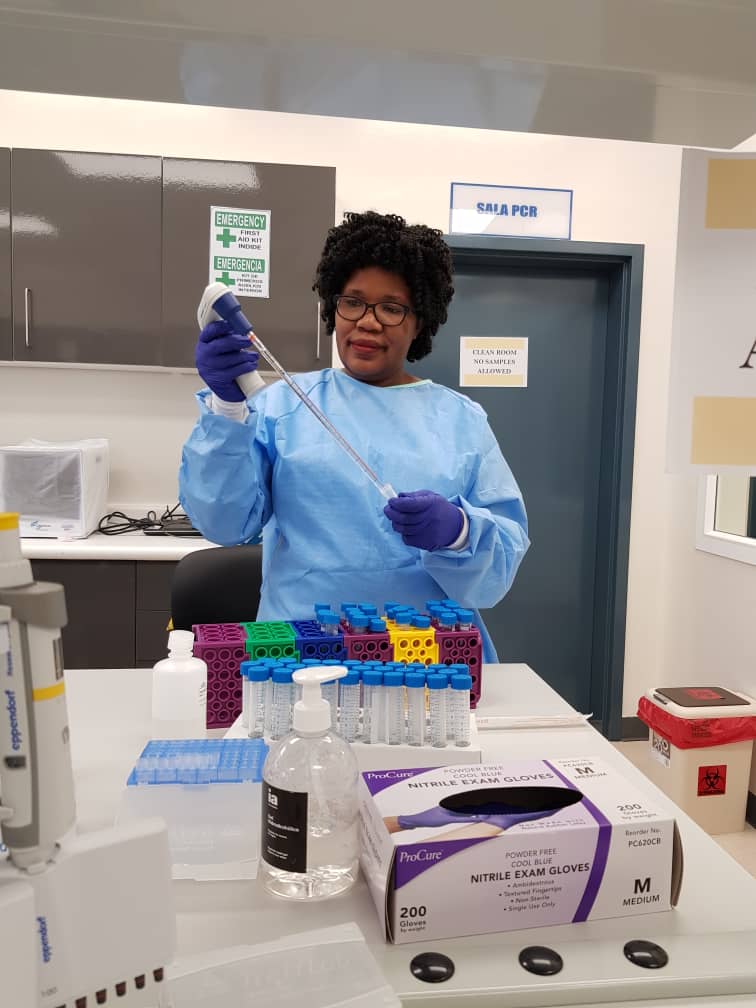MCDI Malaria Warriors Series Presents: Elizabeth Lucas Nyakarungu
April 20, 2020

Elizabeth Lucas Nyakarungu works in the Bagamoyo Research and Training Centre (BRTC) at the Ifakara Health Institute, as well as manages the Baney Research Laboratory in Equatorial Guinea (EG).
When did you start working for MCDI?
I started working with the project 6 years ago. I joined the project on 17 March 2014 as part of south-south cooperation where my institute, the Ifakara Health Institute, was participating as a collaborator.
What is your current role and how has it evolved from when you started?
I am the laboratory Manager of Baney Research laboratory. I joined the project as a lead microscopist to help in the diagnosis of malaria in PfSPZ vaccine projects in Equatorial Guinea, then I became the laboratory study coordinator.
How did you come to work for the project? What was your professional background before coming to MCDI?
I was a laboratory technician and the head of the parasitology department in the Ifakara Health Institute’s Bagamoyo Research and Training Centre in Tanzania. In 2014, there was a need to begin a malaria vaccine trial in Equatorial Guinea. There was a need for an veteran malaria microscopist with prior experience in vaccine and drug clinical trials. Since I was involved in the first PfSPZ challenge study in Africa as a malaria microscopist, I was an added advantage. The purpose was to set up the laboratory within a short time and start the first ever clinical trial in Equatorial Guinea.
What has been the most rewarding aspect of your work with MCDI? Can you cite an example of a rewarding experience you had where you saw the impact of your work or the project first-hand?
I have two rewarding experiences. The first experience was circumventing a linguistic barrier I noticed in the laboratory when I first arrived to train on standard operation procedures, good clinical laboratory practice, laboratory safety, and other protocols. While I spoke English, my colleagues spoke Spanish. Although there was a translator in the lab, it was not possible to have him on-demand all day. My first days were a communications nightmare, but instead of letting that inhibit laboratorial progress, I dedicated myself to learning Spanish to effectively communicate with my colleagues – even going so far as to watch Spanish movies for extra practice. After a short while, we were able to communicate and work as a team, ultimately managing to successfully run all the samples of the first clinical trial in Equatorial Guinea.
The second rewarding experience was the official inauguration of the Baney Research Laboratory in 2019. This was the best moment in my life, as being one of the people who contributed her ideas in the commissioning of the building, was a dream come true.
Describe a typical day in your life on the job? What are your different tasks throughout the day?
Laboratory procedures are planned several days in advance, so we have a general plan of action for each day. However, that often gets added to, so every day is always completely different. Running the laboratory in a different location as the study sites means liaising with different teams to ensure everything runs as smoothly as possible. As a laboratory manager, I split my time between operational management (e.g., scheduling staff, maintaining safety standards, etc.) and laboratory work, which includes quality control of reports as well as ensuring critical values are reported to physicians.
My biggest responsibility is providing the laboratory staff with clear procedures to minimize mistakes. I also ensure that the staff are efficient, as our laboratory is busy, relaying study participant results as soon as possible to doctors so they can manage the volunteers.
How do you see the impact of your work in your local community?
The local community is certainly happy about the presence of the Baney lab. When we began the malaria vaccines project in 2014, everyone was excited to see progress in eradicating malaria and confident the lab will find a solution through vaccination. During this pandemic, the lab is also bearing a large responsibility in testing, as a strong lab infrastructure is crucial in any fight with an infectious disease. Now, just as with malaria, the community is proud to see that their country has a lab that can test for COVID-19. In fact, we are responsible for testing all the cases in the country thanks to our state of the art complex as well as well-trained technicians and scientists.
How has your life changed since you began working for MCDI/the project?
My life has changed tremendously. Joining the project has shown me a lot of hidden skills. The best aspect of my life and role here is the interaction with world class malaria scientists, coupled with the feeling that by doing the unseen work, I remove many headaches and barriers from scientists. Ultimately, I allow them to concentrate on what they do best, and in-turn, I contribute to the incredible work that goes on here. Laboratory Management is the perfect evolution of my scientific career and I consider myself incredibly lucky to be able to do what I love doing. This tremendous progress makes me see a bright future ahead.